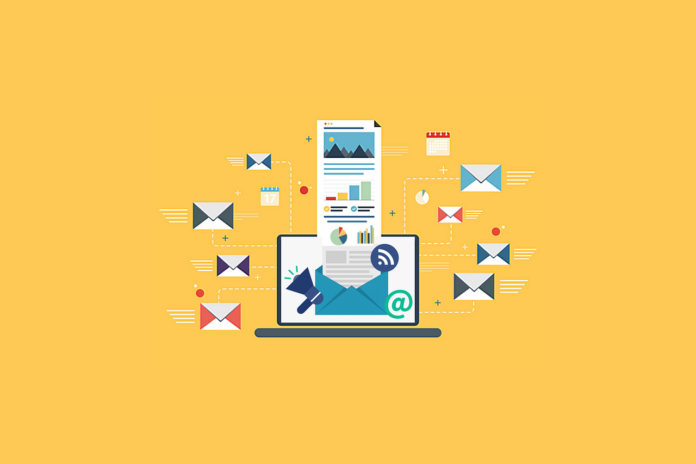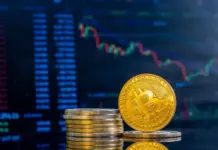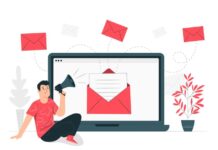Events are an important part of modern marketing strategies. B2C or B2B, brands do event marketing to reach various goals:
- Raise awareness about the brand;
- Educate about a product or service;
- Build a business network;
- Create or change the public perception of the company;
- Communicate live with the audience;
- Stand against competitors;
- Generate content for different platforms;
- Increase sales.
This diversity of applications stems from that an event itself is rather a wide concept that can refer to different activities. And depending on your business type and the service you’re providing, events can be physical or digital.
Physical events include:
- Store opening;
- Public meal (brunch, lunch, dinner) with clients or partners;
- Photoshoot together with customers;
- Charity event;
- Holiday party;
- Anniversary celebration;
- Conference;
- Workshop, etc.
Market digitalization, which started long before the Covid-19 and was speeded up by it, made many marketers look for new virtual ways to hold events. And though digital events may be less exciting and memorable, they still generate interest and engagement.
Modern technologies enable to move almost any physical event online. And while most business events have already been digital for a long time, B2C companies have also started to capitalize on virtual reality. We’ve already seen fashion brands hosting digital runaway shows and restaurants making use of VR and AR for advertising purposes. And more is to come. Besides, online events are more likely to reach an international audience that otherwise can’t attend live events.
Digital events include:
- Conference;
- Convention;
- Workshop;
- Webinar;
- Webcast;
- Q&A with the expert;
- Roundtable;
- Social media live streaming, etc.
But whatever events dominate your marketing, to expect many visitors, first you need to let people know about the activity you’re going to host.
And email marketing invitation remains one of the most effective ways to do it. In the realm of event marketing, email remains a powerhouse for effective communication throughout every stage of the event lifecycle. From initial announcements to post-event follow-ups, a well-thought-out email marketing strategy can significantly enhance engagement and attendance. Leveraging automation tools like eSputnik or Klaviyo allows businesses to streamline their campaigns and engage with their audience seamlessly. However, just as in event marketing, maintaining a clean and verified email list is paramount for successful email campaigns. Utilizing a reliable email verifier ensures that event invitations, reminders, and post-event communications reach the right audience, enhancing the overall effectiveness of your email marketing strategy. So, while orchestrating your next big event, remember that the power of email marketing lies not just in the content but in the precision of your contact list.
How Email Marketing Helps Promote Events?
Email marketing is a great channel to back up every stage of an event organization, from announcements to post-event review collection. When you carefully plan the strategy and think over content for every message, the results can be truly great.
Using emails, you can:
- Inform about the upcoming event;
- Introduce speakers and covered topics;
- Offer early bird tickets;
- Offer extra incentives, like a promo code for VIP seats or access to limited content;
- Send reminders;
- Confirm registration and payment if needed;
- Send tickets;
- Provide finalized details on place and time;
- Send a join link on the day of the event;
- Send a recording link to those who opted to have one;
- Conduct a post-event survey to find out if people liked it and what may need improvement;
- Offer a loyalty program to encourage people to participate in further events.
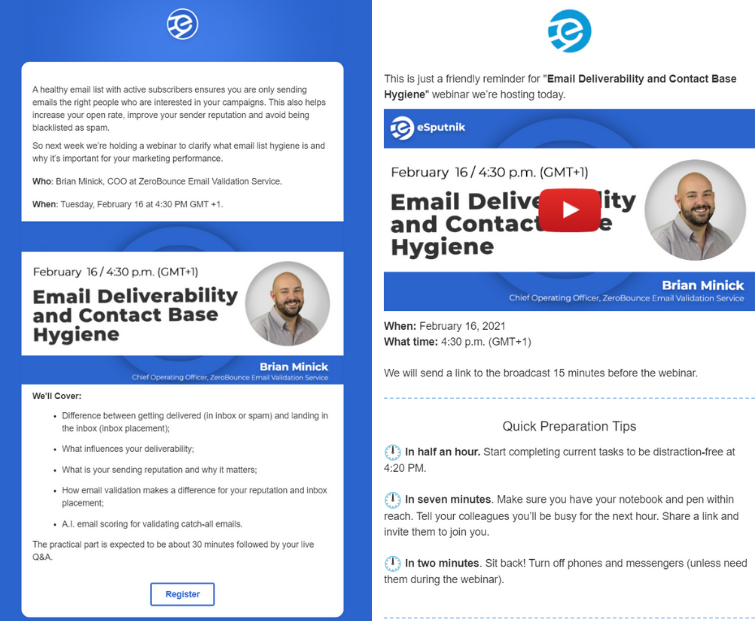
And the best part about it is that most of these emails can be automated. If you use a professional email service provider (eSputnik, Klaviyo, etc.) with extended segmentation options and API support, you can create workflows that will run automatically based on users’ responses.
For example, you send bulk event promos to your whole contact base. Depending on how people react to them, they will receive further messages. Registrants will receive confirmations and event details. Inactive users will first receive incentives and then reminders to use them. People who can’t attend the event will receive a recording link afterward. Actual attendees will receive a survey. And those who leave positive feedback can be asked to leave a review on your site or some third-party platform.
It may sound like a lot of work unless you don’t need to build a separate workflow or segments for each campaign. With email automation, you create the necessary emails once and then add them to a workflow, specifying sending conditions. It will be triggered automatically each time the user performs the target action, and everyone will get the right emails at the right time.
This is how an automated workflow with a promo series can look at its basics:
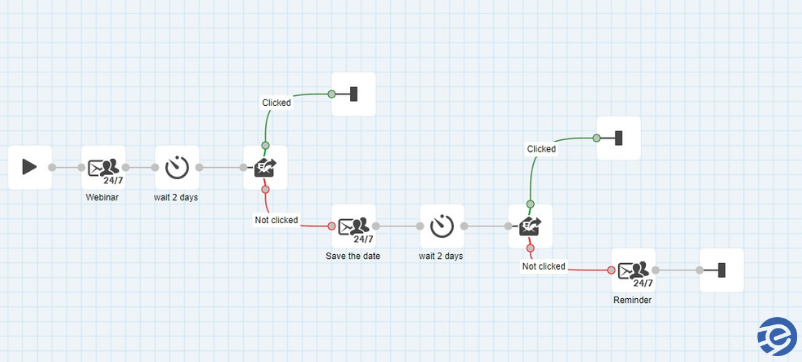
It includes three emails. People who didn’t click a registration button in the first email, receive a promo code for early bird tickets after two days. People who ignored it as well receive a reminder after two more days. People who responded to the very first email don’t receive any further promos. Instead, they may be switched to the successful registration workflow that will send them a confirmation.
What Event Emails to Send
As you may have concluded from the above, event marketing consists of three main stages:
- Pre-Event;
- Day of the Event;
- Post-Event.
Each of them includes different emails and serves a particular purpose.
Pre-Event
Pre-event emails include an invitation, event description, promo codes, other incentives, reminders for inactive users, cross-selling, confirmation, event details, etc.
This is the biggest stage, and it’s crucial for attracting visitors. Your task is to make people excited about your event, so it’s better to start sending announcements weeks before to heighten interest.
When creating a subject line for event invitations, make sure you mention why you’re reaching out. Such phrases as Workshop invitation, We want to invite you, Your invite to, Save your seats, Live session with, etc. ensure your announcement won’t be missed among other regular emails.
On the Day of the Event
These emails focus on registrants only. Their task is to deliver a smooth experience with your company thus ensuring repeat visits. Send a reminder email 30 to 15 minutes before the event to give people time to get ready and finish or put aside their current tasks. Don’t forget to include a join link. Naturally, it should be clickable and active.
If your event is a session or masterclass that presupposes using some extra material (like product ingredients for a cooking class or wool for a knitting session), remind about it as well.
Post-Event
Your email marketing doesn’t end with the event itself. Send a follow-up email or two to keep the conversation going: thank for participation, ask to leave feedback, add a link to the recording, attach any related material (photos, video, results), offer a discount for registration in the next event.
To Sum Up
Email marketing is a great tool to promote any of your events. Automated email campaigns can fit any stage of the event organization, ensuring every user is addressed with the right message. For a better result, start sending announcements weeks before the event, don’t forget to send a reminder on the day, and complete your interaction with proper post-event follow-ups, showing people you appreciate their interest and commitment.
Also Read: Learn How to use Java Mail API to send and receive emails?

